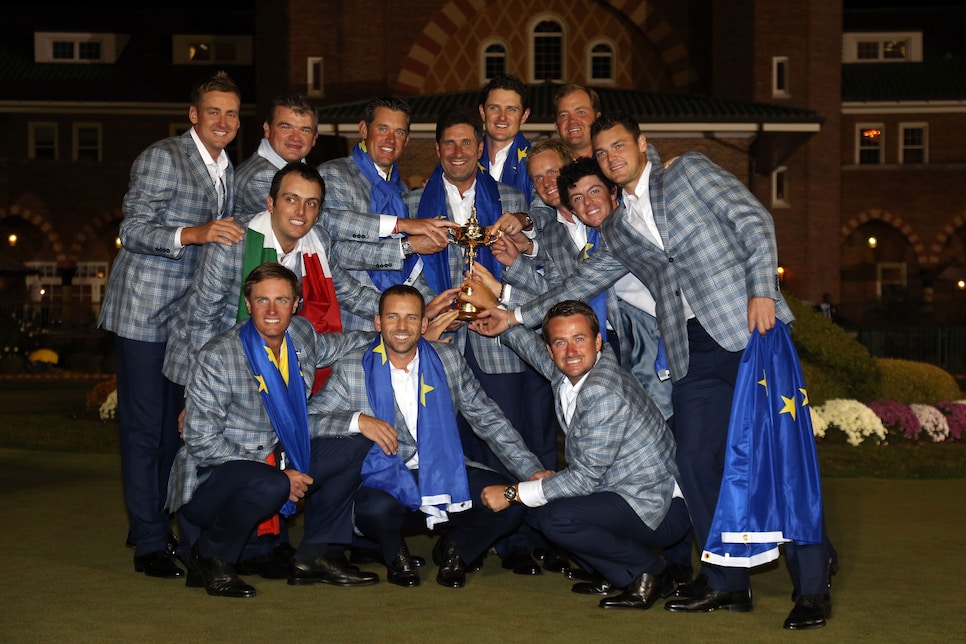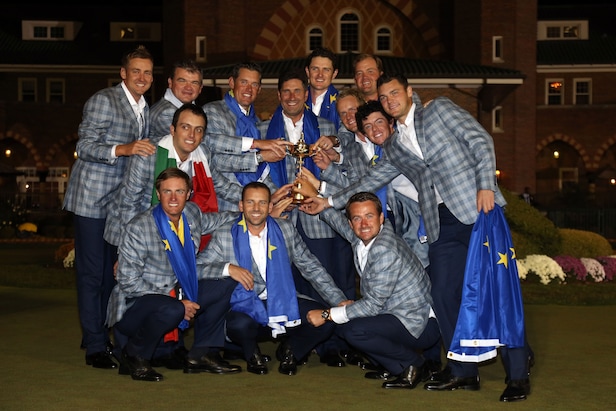Let’s be crystal clear about one thing—no matter what happens at Bethpage Black, the Ryder Cup will remain a healthy financial institution. People, myself included, get excited every time it comes around, and clearly there are a lot of fans willing to pay twice the amount of a yearly gym membership to spend a day attempting to watch it in person. It has become massive, and it will stay massive.
However, as I wrote in Rome last year, it’s competitively broken. If you’re, say, 20 years old, you probably have no concrete memory of a competitive Ryder Cup. The home team keeps winning, and the home team keeps winning by a lot. For five straight Ryder Cups dating back to Gleneagles in 2014—it would be six straight, if not for a miracle comeback by the Europeans in 2012—the home team has won by a margin of anywhere between five and 10 points. In each case, the Sunday singles session has only been dramatic for optimists. “Well, if these five matches get flipped, then maybeee…” Some years, like the American romp at Whistling Straits in 2021, even the optimists can’t pretend it’s anything but a massive rout. The home demolitions have been so reliable that at least for the last decade, you could make an argument that there’s no sporting event where “homefield advantage” is a bigger factor than the Ryder Cup.
Why is this the case? Some people say it’s a historical fluke, a coin landing on heads five straight times. Some say it’s because the home team gets to set up the course to its liking. At this point, though, it’s become clear that it’s about the environment, by which I mean the fans. Aside from the Ryder Cup, there are no real “away games” in professional golf. This isn’t a team sport where you play half your games on the road and can at least attempt to get used to it (even then, home teams enjoy a distinct advantage). Instead, once every two years, you’re thrust into a cauldron with tens of thousands of people rooting against you, and not only is it rare, but those fans are closer than they’d be at any team sport. No matter how much the players steel themselves for that cauldron, or how ready they feel in the week leading up, or—you hear this one every time—how much they claim to like it, they get overwhelmed fast. Golf is a lonely sport and a tense sport at the best of times, and adding the rowdiest fans of the year to the mix in a partisan environment is a brutal handicap (no pun intended).
One more word about the crowds—you can see how loud and passionate they are on TV, but until you’re there, you don’t quite get what the alcohol-fueled volume feels like. Even when the fans are well-behaved, it’s goosebump-inducing, and when they lose the thread, as they did at Hazeltine National, it’s the closest thing we have to the bloodthirsty rabble at a Roman coliseum.
They lift the home team, they shock and then bury the visitors, and it’s no surprise that we have a decade-long home winning streak that—as alluded to above—would be nine straight Cups now if not for the Medinah miracle. This is why I constantly say that the next meaningful Ryder Cup result will be when an away team pulls off a win.
Enter Team Europe, 2025. They’ve done everything right, and the universe seems to be aligning in its direction. Bringing Luke Donald back for a second captaincy is a stroke of genius, and one that raises an interesting historical question. Looking back at the last five Ryder Cups, the visiting captain has either been stuck with a reputation for incompetence, or been plagued with bad luck. Tom Watson was notorious at Gleneagles, Darren Clarke is seen as uninspiring at Hazeltine, Jim Furyk handcuffed himself with iffy captain’s picks in Paris, Padraig Harrington deviated from the Euro template and made some silly mistakes at Whistling Straits, and Zach Johnson is now seen as a blunderer, even though roughly half his team got sick in Rome. The question we have to ask is, were all these guys really that bad, or did they just end up looking bad because it’s so impossible to win on the road?
With Donald at the European helm, we can rule out the specter of bad leadership. We already know he’s a good captain, we know he abides by the template, we know he makes considered decisions, we know his players love him, and we know he can win. Hell, he’s even got the same four vice captains, including stats czar Edoardo Molinari. Behind the scenes, they’ve got an entire advisory committee, populated by Ryder Cup savants like Paul McGinley, this year’s “strategic advisor,” supporting them in any way possible.
And what about those players? As we saw Monday morning, it’s 11 of the 12 same guys from Rome, and the 12th man is the twin brother of the only one who didn’t make it. Give or take a Shane Lowry, they all seem to be in terrific form, with wins and top-fives galore under their belts, and with Rory McIlroy and Jon Rahm aware of the potential moment to grab an elusive road win, they’re incredibly motivated.
On the American side, yes, you have very good players, but you also have an untested captain, four rookies, and only three guys with winning Ryder Cup records.

A miracle Sunday comeback from Europe at Medinah in 2012 was the last time a road team won the Ryder Cup.
Ross Kinnaird
All of which leads to this conclusion: If the visiting team is ever going to be competitive, it’s this European team. From top to bottom, it’s all laid out for them to prove that no, the Ryder Cup isn’t a moribund competitive institution, and that yes, a competently led, on-form away team can still win.
But—this is the tough part—it must happen this year.
If this European team can’t at least keep it close, and if, despite everything above, they still get routed by the Americans, it will be as definitive a conclusion as you can get: the theoretical away team that could actually win this thing simply doesn’t exist. This year’s Team Europe is practically designed in a lab to overcome the disadvantage of playing in front of hostile crowds. It should be the long-awaited defibrillator the event needs. If they can’t do it, nobody will, and we’ll be staring down the barrel of decades of future blowouts. The Ryder Cup will continue in good financial health, but another home runaway at Bethpage would be dismal news; a competitive flatlining, approximate time of death Sept. 28, 2025.
EUROPEAN RYDER CUP TEAM
Rory McIlroy Robert MacIntyre Tommy Fleetwood Justin Rose Rasmus Hojgaard Tyrrell Hatton Shane Lowry Jon Rahm Sepp Straka Viktor Hovland Ludvig Aberg Matt Fitzpatrick
This article was originally published on golfdigest.com

